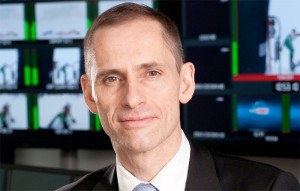
After more than 40 years of operation, DTVE is closing its doors and our website will no longer be updated daily. Thank you for all of your support.
Interview: Jean-Thierry Augustin, CEO, Eurosport
 Eurosport, in which Discovery this week upped its stake to 51%, is looking to develop a stronger local presence under recently appointed CEO Jean-Thierry Augustin.
Eurosport, in which Discovery this week upped its stake to 51%, is looking to develop a stronger local presence under recently appointed CEO Jean-Thierry Augustin.
Further localisation, including investment in key rights, a continued focus on pay TV and the selective development of digital platforms will be key focal points for pan-European sports channel provider Eurosport over the coming year, according to the company’s CEO Jean-Thierry Augustin.
Augustin, speaking to DTVE as his company celebrates its 25th anniversary, says that Eurosport will, in particular, look more carefully at opportunities to localise its offering.
“We have a number of options for becoming more local,” he says, pointing out that until now the channel provider has only operated a local window in France and its British Eurosport offshoot.
Going local doesn’t necessarily mean going head to head with local players for strictly local premium content. Augustin says that, ahead of taking the reins as CEO, he has previously strengthened Eurosport’s local credentials in a number of markets through, for example advising the acquisition of English Premier League rights for countries including Hungary and Romania. Eurosport has also acquired internationally appealing Bundesliga rights for a number of territories.
“The pan-European model stands and is a good proposition for viewers and B2B clients, but I have advocated more local and regional angles. I am looking at developing additional pillars in [a number of] territories,” says. Augustin.
Augustin says that the acquisition of regional sports properties will become more important as Eurosport integrates more closely with Discovery, which acquired a 20% stake in Eurosport from France’s TF1 in 2012 and followed up this week by acquiring a majority stake in the broadcaster.
“We had synergies with TF1 which has been a great shareholder. Now with Discovery we are putting together two great brands and portfolios with a deep knowledge of international markets,” says Augustin.
Eurosport does acquire national sports properties where it makes sense – sharing rights to the Coupe de France with France Télévisions for example, as well as its hold on the French tennis open – but Augustin emphasises the appeal of international properties at a local level. He is also open to developing specifically local offerings depending on the size of the territory.
For Augustin, while competition for national sports rights is heating up – with the likes of BT Sports and Al Jazeera entering the market in the UK and France respectively – this has had little negative impact on Eurosport. “Local players are more affected [but] it does affect everyone because of rights inflation. Rightsholders are not selling cheaper to anyone,” he says. Nevertheless, he says, Eurosport has managed to retain its key rights and has formed solid partnerships with sporting associations.
While the attention of local pay TV players is often focused on football and other key headline rights, Eurosport has invested in rights to a wide range of sports, including the Formula 1 Association-owned World Touring Car Championship and the European Rally Championship. Other partnerships include those with athletics events such as the Summer Universiade held last year in Kazan in Tatarstan, Russia, where more than 10,000 athletes competed over two weeks of events.
Future evolution
Augustin emphasises that Eurosport will continue to focus on the pay TV market – although it provides a free-to-air service in Germany. Key to future evolution of the business will be the development of local and regional advertising revenues, as well as the development of local web presences in key markets such as Russia, where the launch of a dedicated website was championed by Augustin, a Russian speaker.
“Advertising is very valuable and something we can develop for our sister channels,” he says.
Alongside localisation and the building of the advertising side of the business, digital distribution represents another important area of development for Augustin, with Eurosport 360 HD – the group’s immersive multi-view service for major sports events, an initiative developed in Germany along with Sky Deutschland – being a key element of that.
To enhance the digital experience further, Augustin says that Eurosport will, in partnership with a number of operators, introduce a tablet app in the autumn, for example giving viewers access to multiple courts and statistics during tennis tournaments.
More widely, Augustin is looking to expand Eurosport’s presence in the Asia Pacific region and also to take the Eurosport brand to America, where it is now present in the shape of a Eurosport programming block on Discovery’s TLC channel. In both cases, he says, Discovery’s involvement is providing a major boost.
“Entering with a block is a good idea and then with a channel but we need to look at when, where and how,” he says.
In the digital sphere, Eurosport has invested in initiatives that enhance the experience of viewers such as Eurosport 360 as well as non-linear offering Eurosport Player. “Eurosport Player is a marginal offering to serve a few fans and it is not really challenging pay TV – people who want to see an event on Eurosport maybe once or twice a year and don’t want to get into pay TV,” he says. Eurosport 360, on the other hand, can enhance the live experience and thereby strengthen Eurosport’s core offering. The same can be said of the broadcaster’s forthcoming tablet app and the availability of its content on mobile, where viewers can access live events at their convenience.
“We just want to give the best possible experience no matter where you are,” says Augustin.


